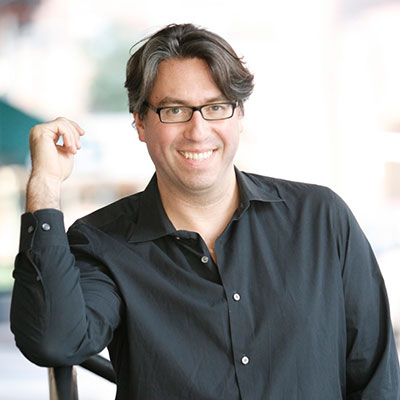by Daniel Hathaway

Julian Wachner has spent his distinguished career with one foot in church music and the other in the concert world. A native of California, he began as a boy chorister at New York’s St. Thomas Choir School and currently serves as Director of Music and the Arts at Trinity Church, Wall Street. An acclaimed conductor of early music, contemporary music, and opera, he also finds time to compose. I spoke with him by telephone last week in Missouri, where he was leading performances of Handel’s Messiah with the Kansas City Symphony.
The Christmas Oratorio holds a special place in Wachner’s career — it’s the first work he recorded 20 years ago, and that recording has recently been re-engineered and re-released. “Jeannette Sorrell told me to pick four of the six cantatas for Cleveland,” Wachner said, “so I thought I’d choose five and six, the ones that aren’t often done, in addition to one and two. There’s such glorious music in the last pair that I thought it would be wonderful to spring those on the audience.”
Bach was famously prolific, but even he would have been challenged to produce six new cantatas in such a small space of time. As it turns out, he repurposed music from works he had already written in 1733 and 1734, using what musicologists call the Parody Technique. Wachner thinks these adaptations are completely masterful, right down to refitting secular music with sacred texts. “He really knew how to rework material,” Wachner said. “You almost wonder if he had another use in mind when he wrote pieces for secular occasions. It’s a bit like cooking with the intention of having good leftovers. ‘Oh, I can use this again.’”
Asked about some of his personal favorites, Wachner said, “I could go through every single movement. The incredible opening of the first cantata with its trumpets and drums. The pastoral sinfonia from the second with its four oboes and two flutes. The Ehre sei Gott or ‘Gloria,’ an incredible piece of polyphony in stile antico. And the opening chorus of No. 6 is just amazing — some of the most intricately polyphonic and colorful music with trumpets and drums. The virtuosity required of the trumpet player really comes out there, even more than in the first cantata.”
Summing it all up, Wachner said, “Bach’s passions feel like passion music, and the B-Minor Mass feels encyclopedic and Catholic, but every single movement of the Christmas Oratorio feels like Christmas in its pastoral sense, in its color, in its well-wishing, and in its maternal aspects.”
Julian Wachner’s debut with Apollo’s Fire was scheduled to take place a few years ago, but was put on hold by the birth of the conductor’s first child (a second arrived in July). But he’s been following the successes of Jeannette Sorrell and Cleveland’s Baroque Orchestra for a long time. “Jeannette and I met over a beer at O’Leary’s in Boston back in the ‘90s,” he said. “It’s wonderful to see that her dream for Apollo’s Fire has been realized, and to be able to join them in the year that they won a Grammy is a huge deal.”
Julian Wachner leads Apollo’s Fire in four cantatas from Bach’s Christmas Oratorio on Wednesday, December 11 at 7:30 pm at St. Noel Church in Willoughby Hills, on Thursday, December 12 at 7:30 pm at St. Paul’s Church in Akron, on Friday, December 13 at 8:00 pm in Gartner Auditorium of the Cleveland Museum of Art, on Saturday, December 14 at 8:00 pm in First Baptist Church in Shaker Heights, and on Sunday, December 15 at St. Raphael Church in Bay Village. Tickets can be reserved online.
Published on ClevelandClassical.com December 10, 2019.
Click herefor a printable copy of this article


